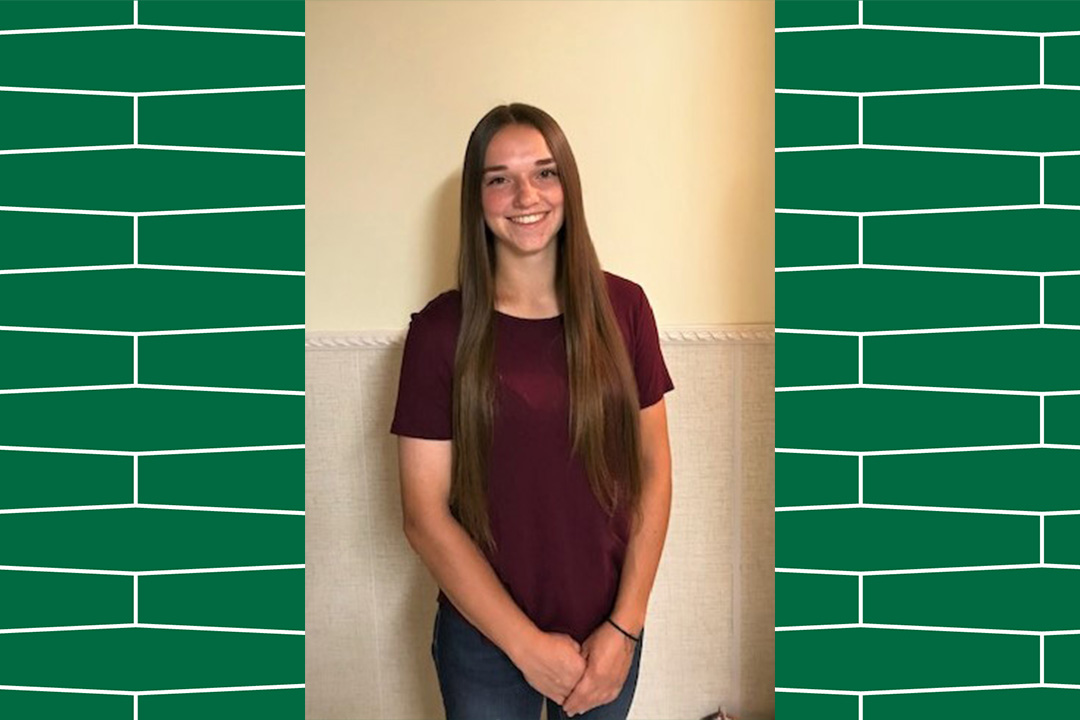
Vet camp and petting zoo part of student’s journey
From the time she could talk, Magdelena (Alena) Lessmeister wanted to be a veterinarian. And now that she’s a first-year student at the Western College of Veterinary Medicine (WCVM), Lessmeister is grateful for the combination of events and factors that inspired her to fulfil that goal.
By Lynne GunvilleFamily background was an important influence for Lessmeister who was raised on a family-oriented hobby farm near Muenster, Sask. She and her three brothers all pitched in to help care for the family’s diverse collection of animals.
“I grew up with poultry, horses and ponies, dogs, cats, rabbits and guinea pigs,” says Lessmeister. “When I was 10, I started adding to the assortment. I got goats, sheep, a donkey, alpacas, pot-bellied pigs, hamsters, turtles, lizards — and I’m sure I’m missing something!”
That assortment of animals brought great pleasure to Lessmeister who enjoyed being around the animals and their unique personalities — the “sassy” donkey and the “goofy, weird” alpacas.
When Lessmeister was 12, her interest in veterinary medicine was intensified by a specific event — a freak accident involving one of their horses that resulted in a significant chest wound requiring veterinary care. Once the family’s veterinarian had sutured the wound, Lessmeister was responsible for the aftercare that involved flushing the wound twice a day until it healed.
That experience strengthened her drive to be a veterinarian. As Lessmeister looks back on the chaos and excitement around the injury, she recalls that those factors as well as her responsibility for the care of the animal all really attracted her to the career.
A couple of years later, Lessmeister had the chance to attend a SCI-FI VetMed camp at the University of Saskatchewan (USask), another significant event in her journey toward a veterinary career.
“It was an amazing experience, and I would highly recommend the camp to anyone interested in veterinary medicine,” says Lessmeister. “One highlight of the camp was being able to stick my arm in the rumen of a fistulated dairy cow. During the week-long camp, we covered many aspects of veterinary medicine that I didn’t realize, and I think the variety of avenues within veterinary medicine really confirmed my decision.”
At that point, Lessmeister began in earnest to prepare herself for a veterinary career. In addition to working hard and excelling at school, she began volunteering with various community organizations. She also continued to work with the family’s farm animals, an opportunity for her to add to her knowledge about the temperament and behaviours of various species.
Lessmeister and her father also spent a summer operating a travelling petting zoo. It was an undertaking that involved communicating and working with the public as she answered their questions and educated them about the various species.
The petting zoo also required that she care for the animals and help manage their stress, particularly when they were surrounded by excited children yelling out questions.
After high school, Lessmeister enrolled in the USask College of Agriculture and Bioresources where she completed three years of the Bachelor of Science in Animal Bioscience program. To gain more experience, she volunteered at the Lac la Biche Humane Society and shadowed clinicians in several mixed animal veterinary practices. She also spent her school breaks volunteering at the Bonnyville Veterinary Clinic in Alberta.
“I enjoyed the environment that the veterinarians and veterinary technicians made in the clinic as well as the fast-paced setting,” says Lessmeister. “The variety of cases that came in each day also added to the excitement.”
As a WCVM student, Lessmeister particularly enjoys the animal handling labs and the opportunities they provide for her to practise working with animals in a low-stress manner. In addition to her busy class schedule, Lessmeister remains connected to her family and the farm’s animals as she maintains a herd of miniature goats for breeding and selling.
When Lessmeister talks about her future, she’s intrigued by the idea of working with food animal production in a mixed or large animal practice.
“I enjoy being able to treat by herds or barns as well as being able to treat individual animals,” she explains. “I enjoy interacting with producers and helping them make viable business decisions as well as treating their animals.”
